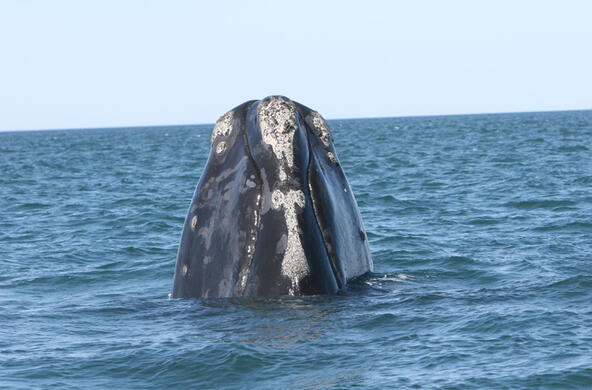Amidst the rapid-fire gutting of federal scientific institutions such as the National Institutes of Health and the National Science Foundation, local and regional researchers fear that the Musk-led Department of Government Efficiency is cutting more than just costs.
“This looks like giving up on science in America,” said Dr. Robyn Smyth, a former program director for the NSF who was summarily dismissed on Feb. 18, “The end result is that we’re ceding our leadership role in science on the global stage to China. Directly and immediately.”
What did DOGE do?
Smyth was born and raised in Glens Falls before earning her PhD in Ecology from the University of California Santa Barbara and landing a faculty position at Bard College. She joined the NSF in Sept. 2023, and after the requisite one-year probationary period, she was vested as a fully tenured program director.
“NSF is kind of the beating heart of science and technology in this country. The money that Congress allocates to us, over 90% of it goes out to colleges and universities and non-profit institutions to do research and education,” Smyth said.
The National Science Foundation was established in 1950 by Congress to promote the progress of science; advance national health, prosperity and welfare; and secure national defense across all 50 states. The scientists who work at the NSF, such as Smyth, are the experts in their fields who, in part, oversee and review what scientific studies and projects should be funded throughout the country. In FY 2024, the NSF allocated approximately $9 billion to over 11,000 projects, which directly supported 357,600 independent researchers, postdoctoral fellows, trainees, teachers and students.
Smyth worked in the Ecosystem Science cluster, one of four subgroups in the Division of Environmental Biology for the NSF. But when she arrived at work on Feb. 18, she was told that she, along with nearly 30 other colleagues, had been retroactively placed back on “probationary,” status which placed her on the DOGE chopping block and disqualified her for her contractually applied severance.
“It’s cruel. The point of it is to be cruel,” Smyth said. “If they meet their goal of reducing the National Science Foundation to 50%, that sounds to me like a skeleton crew.”
DOGE, through the Office of Personnel Management, has been hacking away at federal agencies for weeks as it claims to be looking for ways to curtail government spending.
Smyth stipulated that if the actual intent of the current administration were to shrink the federal workforce and reduce budget costs, as has been stated, there are policies and procedures already in place to legally and humanely do such things.
“It’s called a ‘reduction in force,’ it’s all clearly laid out, the way to do what they want to do; and they’re entitled to do it. But they’re not following that process,” she said. “what’s happening is lawless and reckless.”
On Thursday, a federal judge in San Francisco found that the mass firings of probationary employees conducted by OPM were “likely unlawful.”
“'OPM does not have any authority whatsoever, under any statute in the history of the universe,’ to hire or fire any employees but its own,” U.S. District Judge William Alsup said, according to the Associated Press.
Counsel for the OPM opined that it only asked that the agencies review the placement of probationary employees, suggesting that those jobs could not be guaranteed and that the move to dismiss them was at the discretion of senior leadership. Smyth said it's not yet clear whether the ruling will result in the reinstatement of any employees, but those conversations would be taking place over the next few days.
But as mounting chaos and the number of lawsuits continues to grow against the federal government over its actions, Smyth said, if anything, the roughshod methods of DOGE would only end up costing the American taxpayers in the end.
“This is a farce. This is a spectacle. The taxpayer is going to pay and pay for this,” she said. “The federal workforce has been wronged. The way we demonstrate wrong in our country is through these kinds of lawsuits. I don’t feel good about that, I just want to go to work and do my job – to which I intended to dedicate the rest of my professional life.”
The potential “Brain drain”
Several colleges and universities have rescinded or reduced offers made to PhD candidates due to the uncertainty sowed by the administration.
“The brain drain of this, even if it only lasts a year or two, will ripple through science in the U.S. for a really long time because of what it’s going to do immediately to the training pipeline,” Smyth said. “My former program, the Division for Environmental Biology, which funds much of the research relevant to Lake George and the Adirondacks, lost 25% of its program directors (in the firings). The work of that division seems impossible to me now.”
Several of the projects managed by Smyth’s division focus on long-term ecological research such as are being done at the Cary Institute of Ecological Studies in Millbrook, which directly impacts the Adirondacks.
“More than half our budget for the actual research activities comes from the federal government; mostly from the National Science Foundation,” said Dr. Joshua Ginsberg, president of the institute. “(After the immediate budget and personnel loss) What I am most worried about, is the long-term commitment of this country to being the premier research country in the world.”
The Cary Institute was founded on the idea that long-term investments in science are needed to make lasting improvements to the quality of people’s lives. The loss of this could not only be detrimental to the overall progress of science but have real-world effects on the environment.
In 1963, Cary Institute founder, Dr. Gene E. Likens co-founded the Hubbard Brook Ecosystem study, which eventually led to the discovery that fossil fuel emissions from the mid-west were contributing to acid rain in New England forests.
“And then they spend 15 years advocating for changes to the Clean Air Act, and that is why we do not have acid rain today,” Ginsberg said. “Losing that long-term vision, it’s really hard to quantify what the cost will be, but we do know that those long-term ecological research programs are absolutely critical to understanding how the world works. And they are almost entirely funded by the National Science Foundation.”
Currently, the institute is working on, among other things, two long-term research projects: one, that has already yielded information about the duration of tick season in the Northeast and its connection to the spread of Lyme disease, and one that is studying the causes and effects of wildfire out west, which has become a growing concern in New York State.
“Climate change is influencing the Northeast differently, we’re getting wetter, although we’re getting wetter in big bolts of rain," Ginsberg said. "But we do have draught and there is a potential there (for wildfires).”
Ginsberg acquiesced that the high-level scope of the scientific research being funded through these programs can sometimes be daunting for the layperson to wrap their head around, but said it’s vital that people not lose sight of the significant everyday effects that broad scientific investment leads to.
“While science sounds wonky, and it doesn’t sound like it affects your life, work we do on Lyme disease, work we do on western fires, work we do on the impact of road salt to ecosystems; all those things affect your local community,” he said.
Closer to home, the scientific organizations conducting research on Lake George receive very little funding from the federal government, however, Dr. Brendan Wiltse, executive director of the Lake George Association said the effects of the DOGE purge will almost certainly be felt on the Queen of American Lakes.
“Anything that is going to threaten or undermine the ability for science to be conducted, that’s going to help inform us on how we manage and protect Lake George is obviously a concern for the organization,” Wiltse said. “We have a general concern that if our country is not focused on scientific research and using that to inform policy, that makes our work more challenging.”
What to do?
Both Ginsberg and Smyth suggested that the power to correct the current course of scientific retreat in America, people would need to make their voices, and their priorities, heard.
“It’s really important that you write your congressmen, you write your senators, you write the White House and you say, ‘we care about science, we care about our economy, and the two are completely interrelated,’” Ginsberg said. “That’s going to require Congress and the administration to work together to ensure that we don’t cut off our nose to spite our face; take short-term savings that have long-term losses.”
Smyth encouraged everyone to really think about what such drastic and extensive cuts to our federal workforce could mean for the state of the country in the coming years, as well as what it means for our system of government when Congress allows a President to go unchecked.
“We live in a system of checks and balances. Congressional oversight, shouldn’t need to be only across party lines. Our government should have enough integrity that the Republicans in Congress can do the oversight of the Republican in the Presidency,” she said. “Republicans in Congress need to hear from their constituents that they want to see them assert their constitutional power.”






